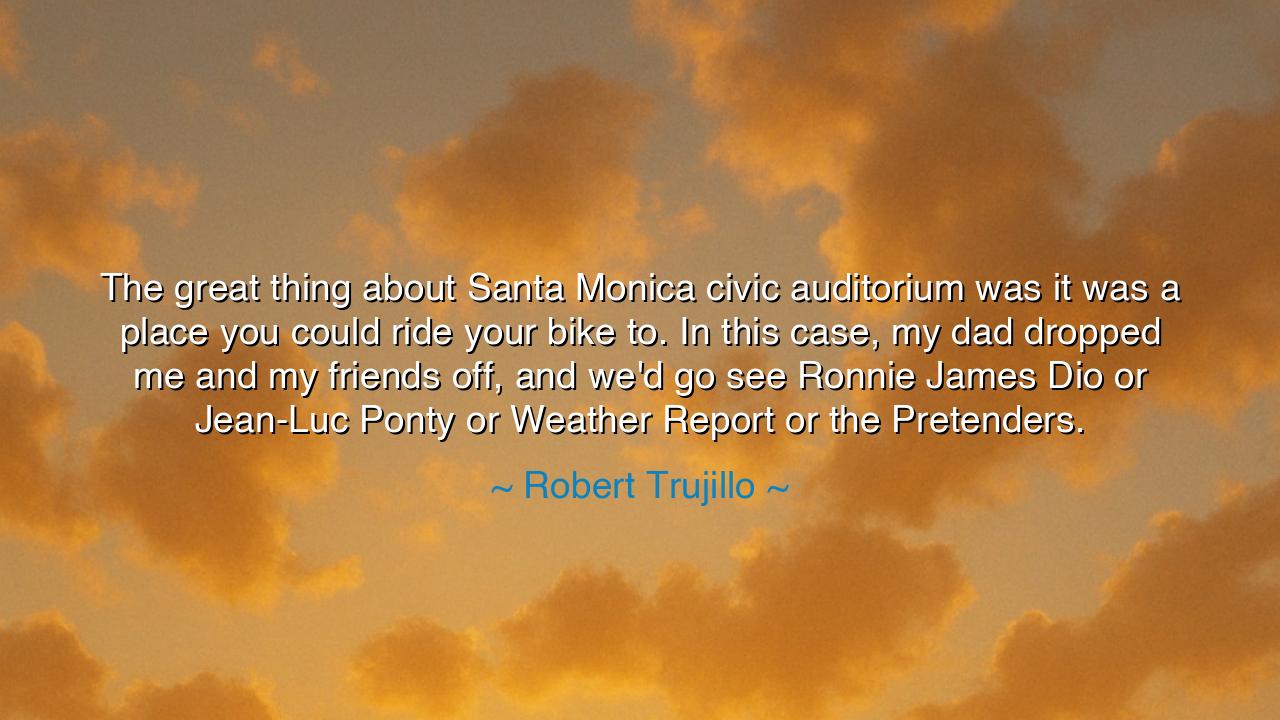
The great thing about Santa Monica civic auditorium was it was a
The great thing about Santa Monica civic auditorium was it was a place you could ride your bike to. In this case, my dad dropped me and my friends off, and we'd go see Ronnie James Dio or Jean-Luc Ponty or Weather Report or the Pretenders.






“The great thing about Santa Monica Civic Auditorium was it was a place you could ride your bike to. In this case, my dad dropped me and my friends off, and we’d go see Ronnie James Dio or Jean-Luc Ponty or Weather Report or the Pretenders.” Thus spoke Robert Trujillo, the master of rhythm and thunder, whose bass lines would one day echo through the temples of modern music. Yet in this simple remembrance, there lies more than nostalgia; it is a hymn to the beginnings of passion, a tribute to the sacred innocence of youth — that fleeting time when art first awakens the soul, when the world is still vast, open, and filled with the promise of discovery.
Trujillo’s words carry the spirit of place and time, for the Santa Monica Civic Auditorium was not merely a building of concrete and sound — it was a sanctuary of dreams. It stood as a gateway to another realm, where music became a living force, where the boundaries between the listener and the performer dissolved in the shared fire of rhythm and emotion. To a young boy, that place was a temple of awakening, and the bike that carried him there was no mere machine — it was a chariot of freedom. The journey, simple as it was, symbolized a rite of passage: the moment when curiosity becomes calling, and admiration becomes inspiration.
Within his memory lies a deeper truth — that the beginnings of greatness are often humble and tender. The man who would one day play upon the world’s grandest stages once stood in awe among the crowd, heart pounding, eyes alight, feeling for the first time the power of live music vibrating through his bones. Those early experiences were not entertainment — they were education. Ronnie James Dio, with his soaring voice; Jean-Luc Ponty, with his fusion of violin and jazz; Weather Report, with their storms of sound; and the Pretenders, with their raw defiance — each became a teacher, a mirror reflecting to the young Trujillo the boundless possibility of art.
There is in this story the universal journey of all who create. Every artist, every thinker, every soul who ever dared to shape the world began as a listener, an admirer, a dreamer standing on the other side of greatness. Trujillo’s recollection reminds us that inspiration is not born in isolation, but in communion — that the flame of creativity is passed from hand to hand, from stage to heart, from one generation to the next. His father, in dropping him off at the auditorium, did more than deliver a child to a concert; he delivered him to destiny. That small act of trust and love became the foundation of a life built on sound and purpose.
In the same way, we are all shaped by the moments that ignite our passions — those places, people, or experiences that awaken something eternal within us. For Trujillo, it was the music halls of youth; for another, it may be the quiet of a library, the roar of a stadium, or the solitude of a mountain path. The sacred lesson here is that one must be open to wonder — to seek out experiences that stir the soul, for they are the raw material of purpose. The ancients taught that the gods speak not always through thunder or prophecy, but through the small joys that whisper to the heart: “This is who you are meant to become.”
There is also in Trujillo’s words a quiet reverence for family and community. The image of a father dropping off his son and friends is not one of grandeur, but of quiet support — the kind of love that gives wings without holding the reins. In the tapestry of memory, such gestures shine as brightly as the performances themselves. For every artist who rises, there are those unseen hands that lifted them, those early kindnesses that gave them permission to dream. The father who waits in the car park, the friend who shares the ticket, the mentor who says, “Keep playing” — these are the silent architects of destiny.
So, my children, learn from Trujillo’s remembrance: greatness begins not in fame, but in curiosity. Nurture your passions, no matter how small they seem. Seek out the places that make your spirit sing, and return to them often. Remember those who first believed in you, for they are the roots that keep your branches strong. And when you have climbed high, as Trujillo did, do not forget the simple joy of the bike ride — the innocence of those early days when the dream was new and the music was everything.
For the Santa Monica Civic Auditorium may one day fall silent, as all earthly places must, but its spirit — and the spirit of every hall, field, or studio where a young soul first discovers beauty — lives forever in those who were transformed by it. To entertain great hopes, as Frost once said, is noble; but to remember the humble beginnings of those hopes is divine. Let Trujillo’s words remind you that within every small moment of wonder lies the seed of destiny — and that the path to greatness often begins not with applause, but with the simple act of listening.






AAdministratorAdministrator
Welcome, honored guests. Please leave a comment, we will respond soon